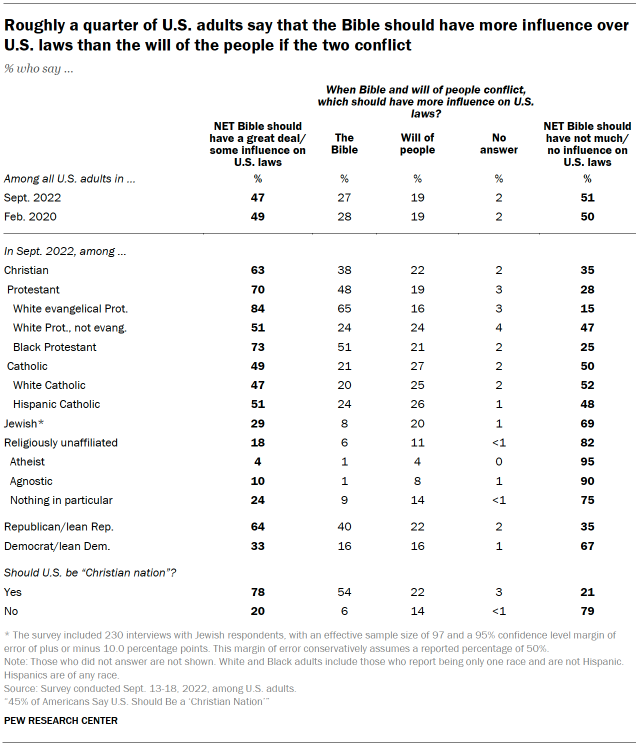Most Americans say religion’s influence in society is declining, and for many people, this is a lamentable development. Americans are much more likely to express positive than negative views of religion in this way. Moreover, just under half of U.S. adults say the Bible should have at least some influence on the laws of the United States, including 27% who say the Bible should take precedence over the will of the people if the two conflict.
At the same time, however, majorities of U.S. adults also say churches and other houses of worship should keep out of politics and refrain from endorsing political candidates. These views are especially common among the growing segment of Americans who do not identify with any religious group; these religious “nones” also are more likely to express negative views toward religion in general.
Americans who say the U.S. should be a “Christian nation” are far more inclined than those who do not hold this view to say churches should endorse political candidates and express their views on social and political issues, and that the Bible should influence U.S. laws. Still, even among those who say they want the U.S. to be a “Christian nation,” many do not want churches to be involved in politics and believe the will of the people should take precedence over the Bible in shaping U.S. laws.
There is no clear consensus about whether it has become easier or harder to be a person who does not believe or practice a religious faith in the United States over the past decade as this group has grown. Slightly fewer than half of Americans (47%), meanwhile, say life in the U.S. has become harder over the last 10 years for people of deep religious faith, much larger than the share who say this has become easier (13%).
This chapter explores these and other findings about Americans’ views regarding religion and public life.
Three-quarters of U.S. adults say religion is losing influence in society
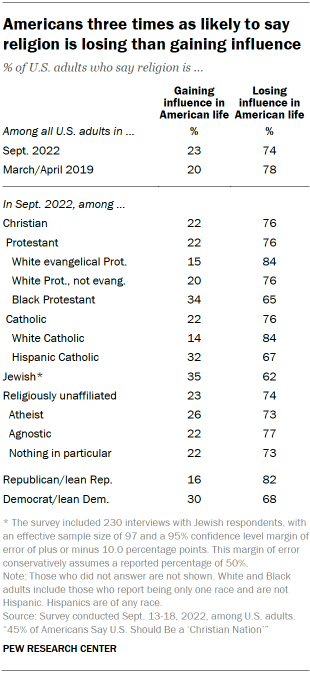
A large majority of Americans (74%) say they think religion’s influence in American life is declining, although this share is down slightly from the last time the question was asked in 2019 (78%). About one-quarter (23%) now say religion’s influence is growing (up slightly from 20% in 2019). Majorities across the religious and political spectrums agree that religion’s influence in American society is waning.
The survey also indicates that Americans are more likely to see religion as a positive influence in American life than a negative one. Four-in-ten U.S. adults say religion’s influence is declining and that this is a bad thing, and an additional 9% say religion’s influence is growing and that this is a good thing; together, 49% express a positive view of religion through these responses. White evangelical Protestants and Republicans are especially likely to say religion is declining in influence and that this is a negative development.
On the whole, far fewer Americans express a negative view of religion by saying either that religion’s waning influence is a good thing (16%) or that religion’s growing influence is a bad thing (10%). There are, however, signs of wariness about religion’s influence among some groups in the population. Roughly half of U.S. Jews, for instance, say either that religion’s influence in American life is growing and this is a bad thing (31%) or that religion’s influence is declining and this is a good thing (23%).3 And large majorities of atheists and agnostics also express a negative view of religion in one of these ways.
Among Democrats and independents who lean toward the Democratic Party, there are more people who express a negative view of religion on these questions (42%) than a positive one (32%).
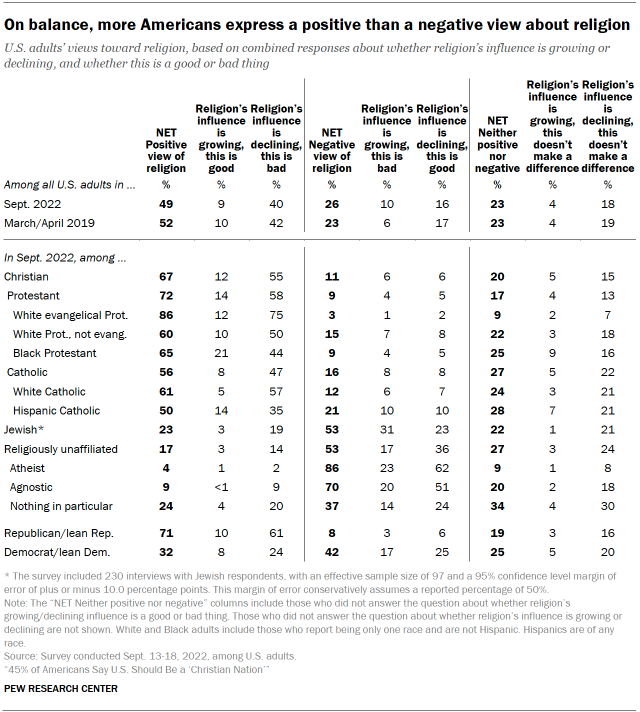
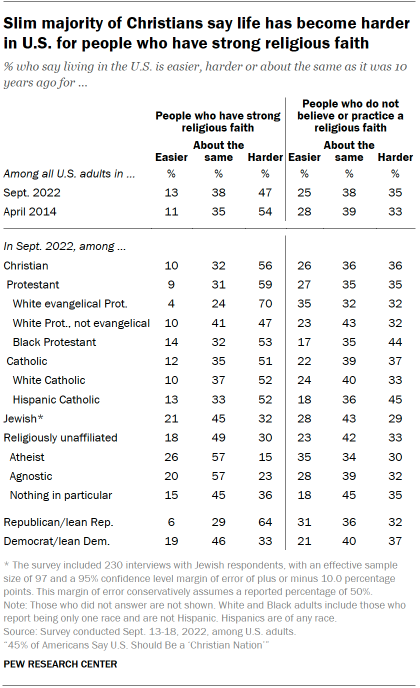
The prevailing view among Christians is that living in the U.S. has gotten harder over the last decade for people who have strong religious faith. By a 56% to 10% margin, far more Christians say life in the U.S. has gotten harder lately for people of deep religious faith than say it has gotten easier, with a third saying it is about the same. Among White evangelical Protestants, seven-in-ten say life in the U.S. has become harder for religious people over the last decade.
By contrast, religious “nones” are more evenly divided as to whether life has gotten harder or easier for people who do not believe or practice a religious faith. A third of religiously unaffiliated Americans say life has become harder for people who are not religious, while 23% say it has become easier and 42% say it hasn’t changed very much.
Most Americans say churches should stay out of politics, refrain from political endorsements
About three-quarters of U.S. adults (77%) say churches and other houses of worship should not come out in favor of one candidate over another during political elections. This view is expressed by majorities across the religious and political spectrums, and by most people who say the U.S. should be a “Christian nation,” as well as by most people who say it should not be a Christian nation. For instance, 62% of White evangelical Protestants and 63% of Black Protestants say churches should avoid endorsing political candidates, as do 70% of Republicans and 84% of Democrats.
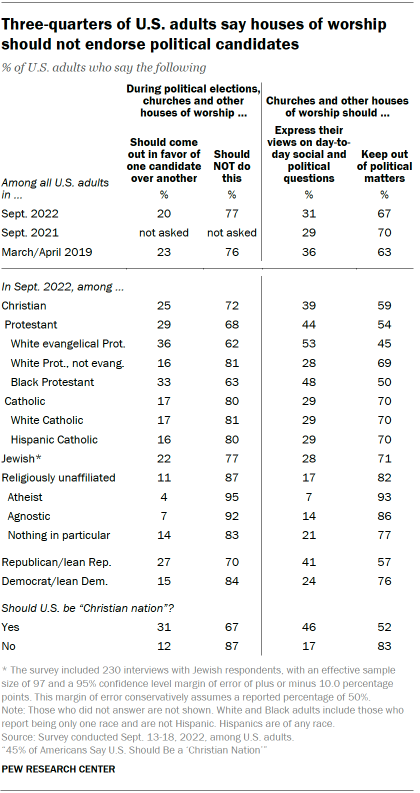
There is a bit more openness to the idea that churches and other houses of worship should “express their views on day-to-day social and political questions” than to the prospect of religious organizations offering explicit endorsements of political candidates. Still, two-thirds of the public (67%) says churches and other houses of worship should “keep out of political matters” and not express their views on social and political subjects.
White evangelicals and Black Protestants are divided as to whether churches and other congregations should keep out of politics or express their views on day-to-day political subjects. In every other religious group measured in the survey, however, there is a clear consensus against political involvement by houses of worship.
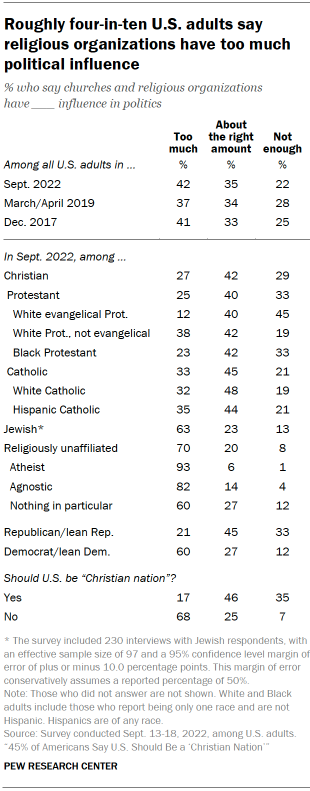
Overall, roughly four-in-ten U.S. adults say churches and religious organizations have too much influence in politics today, while 35% say they have about the right amount and 22% say they don’t have enough political influence.
Jews and religiously unaffiliated Americans are far more apt than Christians to say religious organizations have too much influence in politics. Among Christians, a plurality say religious organizations have about the right amount of influence (42%), while the remainder are divided between those who think religious organizations have too much influence (27%) and those who think they have too little political sway (29%).
Most Democrats say they think religious organizations have too much influence in politics (60%). Among Republicans, by contrast, just 21% say religious organizations have too much political influence, while 45% say they have the right amount and 33% say they don’t have enough political influence.
Among Americans who say the U.S. should be a “Christian nation,” nearly half (46%) say religious organizations have about the right amount of influence in politics, and approximately a third (35%) say they do not have enough influence; fewer than one-in-five (17%) say they have too much influence. In stark contrast, two-thirds of adults who say the U.S. should not be a Christian nation say religious organizations have too much influence in politics (68%).
Just under half of Americans say the Bible should have at least some influence on U.S. laws
Nearly half of U.S. adults say they think the Bible should have a great deal of influence (23%) or some influence (24%) on the laws of the United States, while another half say it should have not much influence (16%) or none at all (36%). The Center asked this question once previously, in February 2020, and found broadly similar results then, though the share who say they Bible should have no influence at all on U.S. laws has ticked up slightly in the last two years (from 31% to 36%).
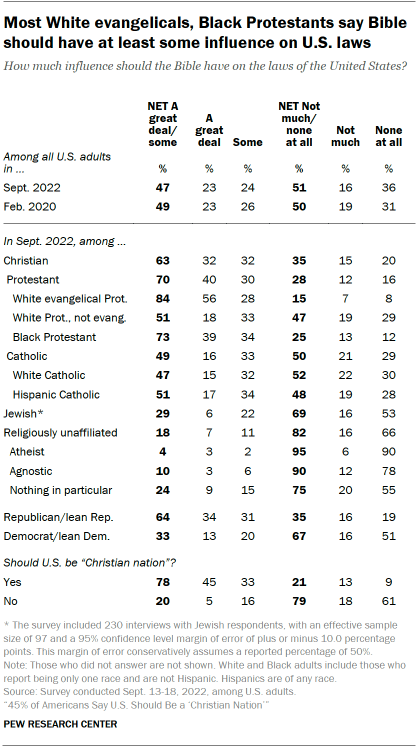
Upward of eight-in-ten White evangelical Protestants say the Bible should have at least some influence on U.S. laws, including 56% who say it should have a great deal of influence. Nearly three-quarters of Black Protestants also say the Bible should have at least some influence on the nation’s laws, and about half of Catholics and White Protestants who are not evangelical feel this way. By contrast, large majorities of Jews and religiously unaffiliated Americans (including 95% of atheists and 90% of agnostics) say the Bible should have little or no influence over the country’s laws.
About two-thirds of Republicans and those who lean toward the Republican Party (64%) say the nation’s laws should be influenced at least some by the Bible. By contrast, two-thirds of Democrats and Democratic leaners (67%) say the Bible should have little or no influence on U.S. laws.
Roughly eight-in-ten Americans who say the U.S. should be a “Christian nation” (78%) also say the Bible should have at least some influence on the country’s laws, including 45% who say it should have a great deal of influence. Among those who say the U.S. should not be a Christian nation, eight-in-ten (79%) say the Bible should have little or no influence on America’s laws, including 61% who say it should have no influence at all.
Respondents who said that the Bible should have at least some influence on U.S. laws were asked a follow-up question: When the Bible and the will of the people conflict with each other, which should have more influence on the laws of the United States?
Overall, 27% of U.S. adults say that the Bible should have more influence on U.S. laws than the will of the people – almost identical to the share who said this when the Center last asked the question in 2020 (28%).
Among Christians, more than a third (38%) say the Bible should take precedence over the will of the people in influencing U.S. laws when the two conflict. Nearly two-thirds of White evangelical Protestants (65%) express this view, as do about half of Black Protestants (51%). By comparison, far fewer Catholics (21%) and White non-evangelical Protestants (24%) say the will of the people should be subordinate to the Bible in shaping U.S. laws.
Four-in-ten Republicans say that the Bible should supersede the will of the people in shaping U.S. laws if the two conflict; fewer than half as many Democrats agree (16%).
Just over half of people who say the U.S. should be a “Christian nation” (54%) also say the Bible should take precedence over the will of the people in shaping U.S. laws when the two conflict. By contrast, upward of nine-in-ten people who say the U.S. should not be a Christian nation reject this view, including 79% who say the Bible should have little or no influence on U.S. laws (and thus were not asked what should happen in cases where it conflicts with the will of the people) and 14% who say the will of the people should supersede the Bible in shaping U.S. laws.
